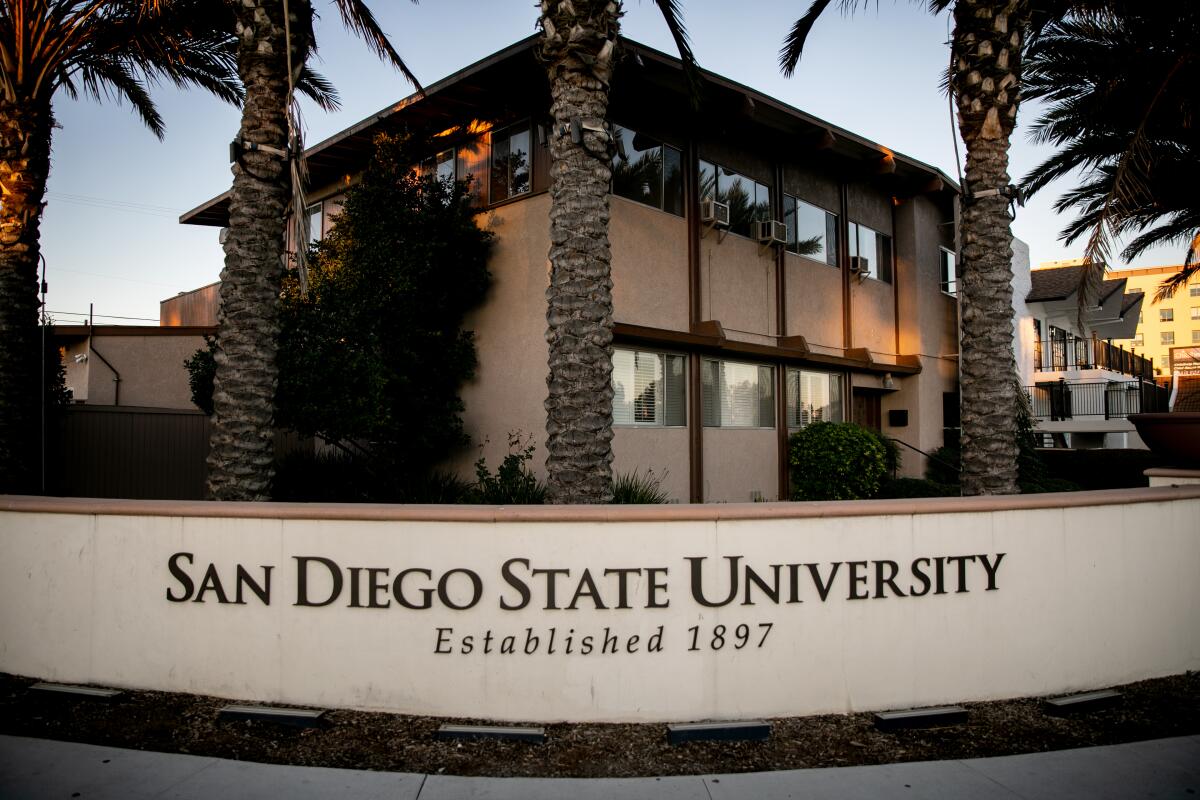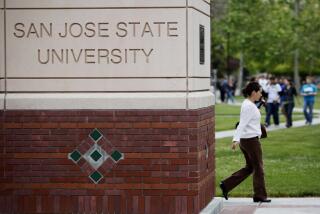One year after a pledge died, San Diego State struggles to control its fraternities
SAN DIEGO — It should have been a momentous night, the kind a fraternity pledge remembers forever.
Three months into his freshman year at San Diego State, Dylan Hernandez was going to learn the name of his “big brother” in a ritual at Phi Gamma Delta.
But not long after the celebration ended, tragedy struck.
Following a night of heavy drinking, the 19-year-old Floridian returned to his dorm, where he fell out of his bunk bed and struck his head. Students found Hernandez unconscious in his Tenochca Hall room and frantically dialed 911.
It proved to be a fatal blow. Campus police would later determine that Hernandez’s blood-alcohol level was, at one point, about 0.23%, almost three times the legal limit to operate a motor vehicle.
But as shocking as the death was, it fit a pattern. For years, San Diego State has been plagued by dangerous and sometimes illegal behaviors within its clutch of fraternities and sororities.
Now, one year after the tragedy, the scope of that misconduct is coming into focus.
An investigation by the San Diego Union-Tribune revealed that in the five years leading up to the accident, Greek chapters were widely and repeatedly called to account for a slew of violations. They allowed underage students to drink alcohol, performed abusive hazing rituals, and were accused of sexual harassment and assault, according to confidential records obtained through the California Public Records Act.
The disciplinary letters showed that 19 fraternities and sororities found themselves in some level of official trouble with the school from 2014 through 2019. That is nearly 40% of at least 49 Greek chapters that were active at the time.
The records describe raucous parties — some attended by hundreds of people — where kegs of beer, hard alcohol and drugs were on hand. They cite at least 18 instances of students being taken to hospitals after drinking too much or suffering some sort of injury, as well as descriptions of serious property damage, including one frat house that was later deemed “unlivable.”
Those 18 transports only reflect incidents that became part of a campus disciplinary procedure. San Diego State says 365 students were taken to hospitals for alcohol and drug-related issues from fall 2015 through fall 2019. The school is not sure how many of those incidents directly involved fraternities and sororities, which rule over the university’s party scene.

Most of the 41 disciplinary letters summarize San Diego State’s investigation into specific policy violations and detail the punishment and stipulations that resulted. Often the university required fraternities and sororities to take specific actions, such as attend educational workshops or develop safety plans for future events, before they could return to good standing.
Despite their bureaucratic language, the letters contain plenty of detail, giving a sense of what it’s like when Greek life goes awry.
The records describe two cases involving both a sorority and a fraternity that were accused of dissuading people who believed they had been drugged at parties from reporting the incident. In another instance, a fraternity held a “Career Day” event featuring a banner that was supposed to look like a porn star’s resume. Near the top was the name of a specific female student.
In one instance, a fraternity member who was serving as a “risk management” officer poured hard liquor down an ice luge for people to consume. A different fraternity engaged in hazing behaviors that involved “forced consumption of alcohol … and group violence” resulting in several injuries, records show.
One fraternity was put on interim suspension for reportedly forcing new members to live in a single room with a chicken. A sorority was put on probation after a midnight hazing ritual that made all of the pledges consider quitting.
The disciplinary records show that 12 of the 13 fraternities that were investigated by San Diego State from 2014 through 2019 violated policies multiple times over. In some cases, the violations occurred while the fraternity was still under sanctions from a previous incident. And suspending or expelling fraternities is a process that can take years.
San Diego State praises its Greek life program on its website, saying it helps students mature and prosper. As is true at other schools, most of these Greek organizations do not get into trouble, and many alumni of fraternities and sororities consider the experience a defining time of their lives.
But campus officials told the Union-Tribune that it regarded fraternities as “high risk” organizations because so many of them ran afoul of the university’s rules.
San Diego State’s Hernandez was one of at least 48 students to die in Greek-related incidents around the country from 2000 to 2019. Eleven of the deaths happened in California.
Florida State University suspended its entire Greek system following the death of a fraternity student. But the ban wasn’t permanent, and such episodes, locally and nationally, have not dimmed the appeal of fraternities and sororities.
Today, because of the coronavirus pandemic, most San Diego State students are taking classes online. But the party scene in the College Area community has continued to crackle. Health officials said students in that neighborhood contributed to the coronavirus outbreak that surfaced in August.
Since the fall semester began, more than 1,400 San Diego State students have tested positive for the virus, the highest number of any college or university in California.
The school staunched the outbreak, partly by confining residential students to campus dorms for part of September. San Diego State officials also roamed the streets of College Area, looking for students who were violating the COVID-19 rules.
On Oct. 30, county health officials took the unprecedented step of issuing cease-and-desist orders to eight College Area homes because they were rumored to be the sites for upcoming Halloween parties. Six of the homes were San Diego State fraternity and sorority houses, health officials said. University officials said they requested that the county take such action to help the school adhere to public health guidelines regarding COVID-19.
After Hernandez‘s death, university President Adela de la Torre created two task forces, one that examined student activities and safety and one that studied alcohol and drug misuse.
The groups, which were largely run by people who work or study at San Diego State, or alumni and school supporters, did not clearly quantify the depth of alcohol use and abuse among the school’s student body in general or Greek life in particular.
Nor did San Diego State seek to overhaul how fraternities and sororities operate, or provide a detailed account of why the school has so many medical transports.
Not all fraternity violations are serious. But the ones that are serious often have a common denominator: alcohol.
It’s a constant source of worry for college administrators nationwide. Even though most college students won’t be old enough to legally drink until they’re several years into their college experience, about 1,500 a year die of alcohol-related injuries.
About 30% of full-time college students ages 18 to 22 engaged in binge drinking in 2018, according to a large federal survey.
At San Diego State, the use of alcohol by the Greeks and the rest of the student body is so pervasive the university estimates that several thousand students would benefit from recovery programs.
The problem is central to the disciplinary record of Phi Gamma Delta, the fraternity where Hernandez drank during last year’s big brother-little brother ceremony.
According to university records, Phi Gamma Delta was repeatedly investigated for committing a series of violations in the years before Hernandez’s death.
As early as 2016, allegations of “ongoing hazing,” binge drinking and sexual assault were already being leveled at the fraternity.
One letter describes a Phi Gamma Delta social event in which two people were transported to a hospital, one for intoxication and one for an injury. During the same event, there was a report of a sexual assault that quickly resulted in a member being expelled from the fraternity, records say.
San Diego State put the fraternity on probation and required members to undergo a series of educational workshops in 2017. But that wasn’t the end of the trouble. Less than a year later, while the fraternity was still under sanctions from previous violations, the university began investigating a new incident in which Phi Gamma allegedly failed to responsibly handle alcohol and keep it away from minors.
Phi Gamma challenged the allegations but got pushback from university officials who suspected members of lying and retaliating against people who spoke out against the fraternity, records say.
“This behavior demonstrates that Phi Gamma Delta is more concerned with who the chapter believes ‘wronged’ the fraternity than holding chapter members and the organization accountable,” a disciplinary letter says.
The college placed new sanctions on the fraternity, but in early 2019 it was again accused of giving alcohol to underage people. Later that year, Hernandez died.
In August, the fraternity’s national office permanently suspended its San Diego State chapter, citing the university police department’s investigation into Hernandez’s death. The university also expelled the organization until 2030.
Robbins and Winkley write for the San Diego Union-Tribune.
More to Read
Sign up for Essential California
The most important California stories and recommendations in your inbox every morning.
You may occasionally receive promotional content from the Los Angeles Times.










